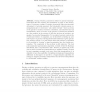Free Online Productivity Tools
i2Speak
i2Symbol
i2OCR
iTex2Img
iWeb2Print
iWeb2Shot
i2Type
iPdf2Split
iPdf2Merge
i2Bopomofo
i2Arabic
i2Style
i2Image
i2PDF
iLatex2Rtf
Sci2ools
RECOMB
2006
Springer
2006
Springer
Sorting by Weighted Reversals, Transpositions, and Inverted Transpositions
Abstract. During evolution, genomes are subject to genome rearrangements that alter the ordering and orientation of genes on the chromosomes. If a genome consists of a single chromosome (like mitochondrial, chloroplast or bacterial genomes), the biologically relevant genome rearrangements are (1) inversions--also called reversals--where a section of the genome is excised, reversed in orientation, and reinserted and (2) transpositions, where a section of the genome is excised and reinserted at a new position in the genome; if this also involves an inversion, one speaks of an inverted transposition. To reconstruct ancient events in the evolutionary history of organisms, one is interested in finding an optimal sequence of genome rearrangements that transforms a given genome into another genome. It is well known that this problem is equivalent to the problem of "sorting" a signed permutation into the identity permutation. The complexity of the problem is still unknown. The best p...
Computational Biology | Genome Rearrangements | Inversions--also Called Reversals--where | RECOMB 2006 | Relevant Genome Rearrangements |
Related Content
| Added | 03 Dec 2009 |
| Updated | 03 Dec 2009 |
| Type | Conference |
| Year | 2006 |
| Where | RECOMB |
| Authors | Martin Bader, Enno Ohlebusch |
Comments (0)

